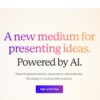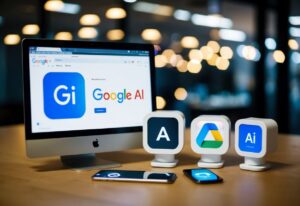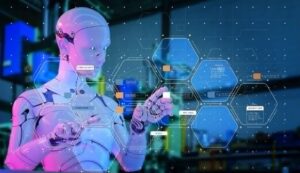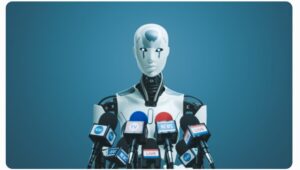AI Technology Examples Transforming Business Operations
AI has evolved from a futuristic concept into a powerful tool that is reshaping business operations across industries.
Whether it’s improving customer service, optimising supply chains, or enhancing cybersecurity, AI technology examples are at the forefront of business innovation.
In this article, we will explore examples of AI technology that are transforming how businesses function, providing real-life examples and case studies where applicable.
1. AI Technology examples: Customer Service
AI technology is revolutionising customer service through the use of chatbots and virtual assistants.
These tools can handle customer inquiries 24/7, providing fast, accurate, and personalised responses.
Chatbots such as Zendesk’s Answer Bot can process customer queries in real-time, resolving issues and directing customers to relevant resources without human intervention.
This reduces response times, enhances customer satisfaction, and lowers operational costs.
For example, H&M uses AI-powered chatbots to assist customers in finding products, answering questions, and providing order updates.
These chatbots handle thousands of customer interactions daily, significantly improving operational efficiency.
2. AI Technology examples: Supply Chain Management
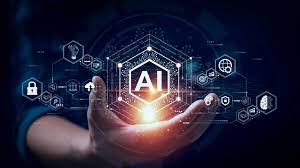
AI algorithms can analyse historical data and external factors such as weather or economic changes to predict demand.
This allows companies to maintain optimal inventory levels and reduce waste.
A prime example is Amazon, which uses AI to automate and enhance its supply chain.
Through the use of AI-powered robots, Amazon warehouses are more efficient, while machine learning models optimise delivery routes and reduce shipping times.
Additionally, Siemens utilises AI for predictive maintenance. AI monitors factory equipment, predicting failures before they occur, leading to reduced downtime and maintenance costs.
3. AI Technology examples: Marketing and Advertising
AI technology is radically improving marketing through personalised experiences, targeted advertising, and AI-driven content creation.
Personalisation algorithms allow businesses to deliver highly tailored marketing campaigns.
For example, Spotify leverages AI to recommend music based on user behaviour, ensuring an engaging and personalised experience for each listener.
In advertising, AI-driven programmatic advertising ensures that ads are placed in front of the right audience at the right time.
Google Ads uses AI to determine when, where, and to whom ads should be shown, optimising ad spend and improving conversion rates.
AI tools such as Jasper or Copy.ai also generate content for social media, blog posts, and marketing copy, reducing the workload for marketing teams and allowing them to focus on creative strategy.
See related posts:
- TOP 10 LIST OF BEST AND COMMONLY USED AI TOOLS FOR PERSONAL FINANCE
- AI for Home Use: Ways AI is Enhancing Smart Living
- 8 Powerful AI Writing Assistants – Both Free & Paid
- How AI is Transforming Urban Life and Smart Cities: Enhancing Efficiency and Livability
4. AI Technology examples: Recruitment and Human Resources
AI technology is transforming the recruitment process by automating repetitive tasks such as CV screening and interview scheduling.
AI-powered applicant tracking systems (ATS) like Greenhouse use machine learning algorithms to screen resumes, rank candidates, and predict their fit for the role.
This reduces human bias and speeds up the hiring process.
Unilever has implemented AI in its recruitment process, using video interviews where
AI analyses the candidate’s facial expressions, tone of voice, and word choice to assess whether they are a good fit for the company.
This has significantly reduced the time-to-hire and increased the quality of new hires.
5. AI Technology examples: Predictive Maintenance
In industries such as manufacturing, AI is making predictive maintenance more efficient and cost-effective.
Traditional maintenance schedules can be inefficient and lead to unnecessary downtime. AI, however, uses data from sensors to predict when equipment will fail, allowing companies to perform maintenance only when it is needed.
This reduces operational costs and prevents unexpected equipment failures.
General Electric (GE) has implemented AI in its wind turbines, using sensors and AI algorithms to detect early signs of wear and tear.
This has improved the operational efficiency of their wind farms, saving millions in maintenance costs.
6. AI Technology examples: Data Analytics
AI has become an essential tool in data analytics, allowing businesses to analyse vast amounts of data quickly and accurately.
AI-powered machine learning algorithms can sift through datasets to find patterns, trends, and correlations that humans might miss.
This helps companies make data-driven decisions and develop more targeted strategies.
For instance, Netflix uses AI to analyse user data such as viewing habits, ratings, and searches.
This allows them to recommend personalised content, keeping users engaged and subscribed.
The company’s AI system has been critical in improving customer retention and increasing viewership.
See related posts:
- TOP 10 LIST OF BEST AND COMMONLY USED AI TOOLS FOR PERSONAL FINANCE
- AI for Home Use: Ways AI is Enhancing Smart Living
- 8 Powerful AI Writing Assistants – Both Free & Paid
- How AI is Transforming Urban Life and Smart Cities: Enhancing Efficiency and Livability
7. AI Technology examples: Financial Services
AI technology is playing a crucial role in financial services, particularly in fraud detection, risk management, and trading.
AI-driven fraud detection systems can analyse financial transactions in real-time to identify unusual patterns and flag suspicious activity.
For example, JPMorgan Chase uses AI to monitor millions of transactions every day, identifying potential fraud cases with greater accuracy than human analysts.
This not only protects the bank but also its customers from fraudulent activities.
Additionally, AI is used in algorithmic trading, where machine learning models analyse historical and real-time data to make more accurate investment decisions.
8. AI Technology in Healthcare
AI is transforming healthcare by improving diagnostics, treatment planning, and patient outcomes.
AI-powered tools can analyse medical data, images, and test results to assist doctors in diagnosing diseases faster and more accurately.
Google’s DeepMind developed an AI algorithm that can diagnose eye diseases as accurately as expert ophthalmologists by analysing retinal scans.
This technology is helping healthcare providers deliver quicker and more precise diagnoses, potentially saving lives.
AI is also playing a significant role in drug discovery. Companies like Pfizer use AI to analyse large datasets to identify potential drug candidates more quickly than traditional methods.
9. AI Technology examples: Retail
AI is enhancing the retail sector by improving customer experiences, optimising stock management, and increasing security.
AI algorithms are used to predict demand and ensure that retailers stock the right products at the right time. Zara has adopted AI to optimise inventory across its global supply chain, reducing excess stock and ensuring stores are stocked based on local demand.
AI-powered facial recognition technology is also being used in stores to enhance security and prevent theft.
Retailers can identify potential shoplifters or suspicious behaviour in real-time, improving safety for both customers and staff.
10. AI Technology in Cybersecurity
As businesses face increasing cybersecurity threats, AI is proving invaluable in identifying and responding to potential attacks.
AI-powered cybersecurity systems use machine learning algorithms to analyse network traffic, detect suspicious activities, and respond to threats faster than human analysts.
Darktrace, a leading AI cybersecurity company, uses machine learning to monitor network activity in real-time.
Its system identifies unusual patterns that might signal a cyberattack and can autonomously respond to neutralise the threat before it escalates.
Rounding up
AI technology examples are reshaping business operations across industries, driving efficiency, automation, and data-driven decision-making.
From customer service and supply chain management to marketing and cybersecurity, AI offers endless possibilities for innovation.
As AI continues to evolve, companies that embrace and integrate this technology will undoubtedly gain a competitive edge in their respective markets.
For more insights into how AI is revolutionising business, explore this comprehensive guide on AI technology.

